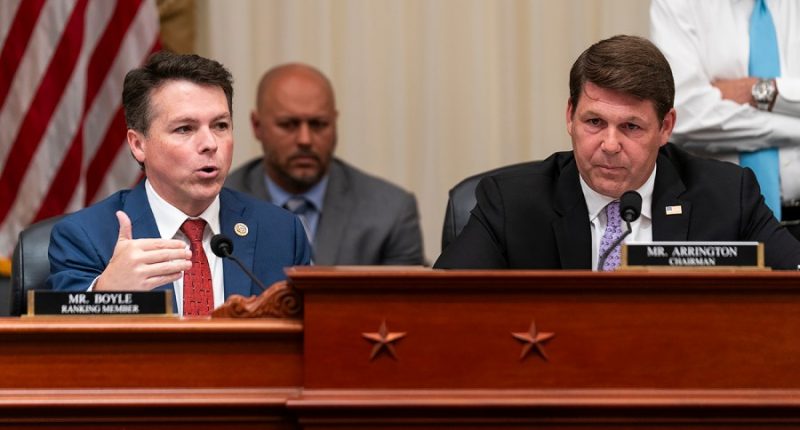Share this @internewscast.com

Republican deficit hawks permitted President Trump’s legislative priority bill to move forward from the House Budget Committee through an unusual late-night vote on Sunday, marking an important milestone for House GOP leaders and indicating progress among the divided Republican factions.
Commencing the session after 10 p.m. on Sunday, the committee voted 17-16 to push the “One Big Beautiful Bill Act” forward. This legislation seeks to prolong Trump’s tax cuts, bolster his border funding priorities, and enact reforms to Medicaid and food assistance programs.
The four Republican members who had previously obstructed the vote on Friday — Reps. Ralph Norman (S.C.), Chip Roy (Texas), Andrew Clyde (Ga.), and Josh Brecheen (Okla.) — decided to vote present, allowing the bill’s progression. Roy disclosed that advancements had been made regarding an earlier start date for new Medicaid work requirements and hastening the phase-out of green energy incentives.
In a sign of the high-stakes nature of the vote, the Speaker as well as White House Legislative Affairs Director James Braid made appearances off a room to the side of the late night Budget Committee affair.
Speaker Mike Johnson (R-La.) said they are counting the vote “as a big win tonight.”
“There’s a lot more work to do, we’ve always acknowledged that towards the end there will be more details to iron out, we have several more to take care of,” Johnson said. “But I’m looking forward to very thoughtful discussions, very productive discussions over the next few days, and I am absolutely convinced we’re going to get this in final form and pass it in accordance with our original deadline, and that was to do it before Memorial Day.”
“So this will be a victory out of committee tonight, everybody will make a vote that allows us to proceed and that was my big request tonight.”
The next stop is the House Rules Committee, which is set to take up the legislation later this week and make last-minute changes to the bill to reflect any compromises and demands between deficit hawks and moderates in high-tax states.
Despite the victory for leadership, the conservatives indicated they still have more work to do.
Roy said that while he voted present “out of respect for the Republican Conference and the President,” the bill “does not yet meet the moment.”
He said the revamped measure would “move Medicaid work requirements forward and reduces the availability of future subsidies under the green new scam.” But, in a statement on X, he objected to provisions around green energy tax credits and Medicaid.
“This all ultimately increases the likelihood of continuing deficits and non-Obamacare-expansion states like Texas expanding in the future. We can and must do better before we pass the final product,” he wrote, alluding to wanting even more controversial Medicaid reforms like reining in the provider tax mechanism that allows states to extract more federal Medicaid matching dollars.
Norman also indicated he was looking for changes.
“We had some great changes, got a lot more work to do. We’re excited about what we did, we wanted to move the bill forward and it went like I thought,” he said.
We’ve been downgraded three times, we have problems with the money in this country, the debt, the FMAPs gotta be dealt with,” he said, referencing the share of Medicaid paid for by the federal government.
Roy, who also sits on the Rules panel, would not commit to voting to advance the bill in that upcoming vote. He would not answer questions about whether Trump — who on Friday had pressed Republican “GRANDSTANDERS” to “STOP TALKING, AND GET IT DONE!” — had talked to him about the bill.
The vote comes after four hardline conservatives on the committee tanked a vote on the legislation Friday, saying the cost-cutting measures in the bill did not go far enough.
Those fiscal hawks had said new Medicaid work requirements on “able-bodied” single adults and repeal of green energy incentives do not kick in soon enough, causing them to worry that the savings that are back-loaded on the overall 10-year cost of the package will not actually be realized.
On the other end of the Republican conference, moderates in high-tax states are demanding an increase to the state and local tax (SALT) deduction cap, currently written as $30,000 — a figure that amounts to three times the current level, but that moderates says is not acceptable to win their votes for the sprawling package. Making changes to appease those members will require tweaks to the bill elsewhere.
While those changes are not fully ironed out, it was good enough for the holdouts to allow them to go forward.
“In an effort to move this bill forward, and I’m excited about the changes we’ve made, I vote present,” Norman said.
Democrats on the other side of the room exclaimed: “What changes?”
Ranking member Brendan Boyle (D-Pa.) made a number of inquiries on those “side deals” being negotiated behind closed doors, saying that lawmakers and the public deserved to know what those are.
Updated at 11:04 p.m.














